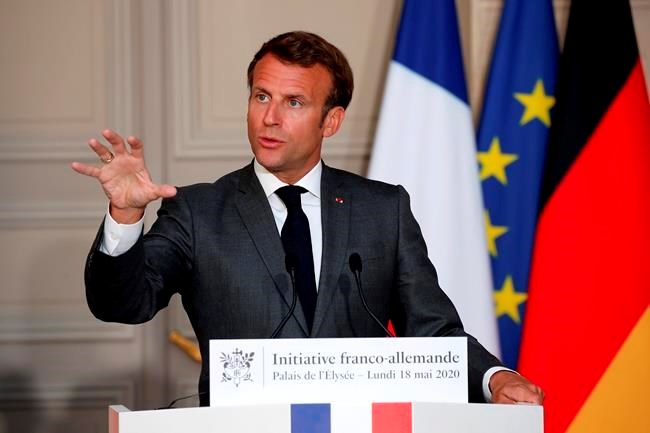BERLIN — The leaders of Germany and France agreed Monday on a one-off 500 billion-euro ($543 billion) fund to help the European Union recover from the coronavirus pandemic, a proposal that would add further cash to an arsenal of financial measures the bloc is readying to cope with the outbreak's economic fallout.
Following a video call, German Chancellor Angela Merkel and French President Emmanuel Macron said the plan would involve the European Union borrowing money in financial markets to help sectors and regions that are particularly affected by the pandemic.
Crucially, the money would be disbursed in the form of grants rather than loans, with repayments made from the EU budget, an unprecedented proposal that overcomes long-standing objections in Berlin to the notion of collective borrowing.
“Because of the unusual nature of the crisis we are choosing an unusual path,” Merkel told reporters following the joint announcement.
Macron said the proposal was a way “to make Europe move forward.”
“We must draw all lessons from this pandemic,” he said, insisting on the need for “solidarity” between EU member states.
Macron acknowledged that a French-German deal alone “doesn’t mean an agreement from the 27.” The EU’s executive Commission would make its own proposal to EU member states and “we hope that the French-German deal will help,” he said.
European Commission President Ursula von der Leyen welcomed the proposal. “It acknowledges the scope and the size of the economic challenge that Europe faces, and rightly puts the emphasis on the need to work on a solution with the European budget at its core,” she said.
There has been concern in European capitals that the pandemic and the bloc’s initial uncoordinated response to it could boost anti-EU sentiment in member states.
Merkel said it was important to ensure that all EU countries could respond to the economic challenge “and that requires this unusual, one-off effort that Germany and France are now prepared to take.”
“The goal is for Europe to emerge from the crisis stronger,” she said.
National parliaments will have their say on the proposal, which is also likely to run into strong resistance from fiscal hawks in the bloc such as Austria and the Netherlands.
Dutch Finance Ministry spokesman Jaap Oosterveer said the ministry was studying the plan and had no immediate comment.
Merkel expressed cautious optimism, however, that the agreement between Berlin and Paris would win widespread support.
“I believe that if Germany and France send a signal, that's something which encourages the quest for consensus in Europe," she said.
So far, EU countries engage in only limited common borrowing, for instance through the European Investment Bank and the union’s bailout fund for crisis-hit governments, the European Stability Mechanism, but require eventual repayment by member states.
By using the financial clout of the whole bloc, bondholders get a high degree of certainty they will be paid back, meaning the EU can borrow on more
The coronavirus crisis has raised concerns that Italy, which already has a debt pile equal to 135% of its annual economic output, could come out of the recession with so much added debt that bond investors would be reluctant to continue financing its debt, which could trigger a financial crisis.
Merkel noted that combined with an earlier stimulus package of 540 billion euros based on loans and guarantees the EU member states were mustering 1 trillion euros at the EU level, and a total of 3 trillion euros when combined with the multi-year EU budget and measures agreed at the national level.
The total is equivalent to almost 20% of the EU’s 2019 economic output.
Macron and Merkel agreed that spending from the recovery fund would focus on areas that would benefit most from future investment, including digitalization, the green economy and pandemic resilience in the health sector.
____
Corbet reported from Paris. Raf Casert in Brussels and David McHugh in Frankfurt, Germany, contributed to this report.
Frank Jordans And Sylvie Corbet, The Associated Press




